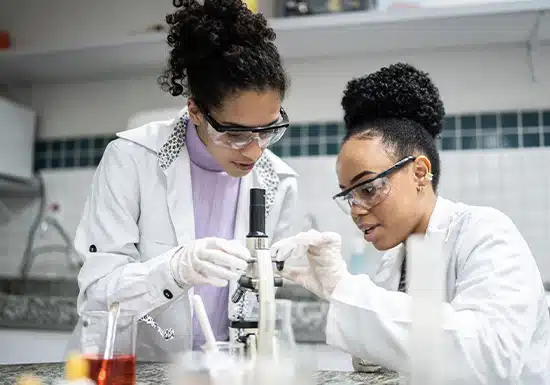The Science of Observation: Comparing Observational Study vs Experiment
Updated: October 3, 2024

Observation is fundamental in scientific inquiry, helping researchers understand complex phenomena by collecting data and evidence. Observational studies and experiments are two primary research methods for gaining insights and drawing conclusions.
While observational studies involve monitoring subjects without interference, experiments involve manipulating variables to study effects. Each method has its strengths and limitations.
Scientists often use both observational studies and experiments to complement each other, ensuring a thorough understanding of the subject and validation of findings.

What is an Observational Study?
An observational study is a research method where researchers observe and collect data without manipulating the environment or influencing the subjects. This non-experimental approach allows for the natural occurrence of events and behaviors, providing valuable insights into real-world situations.
Observational studies are commonly used in fields like epidemiology, sociology, and ecology, where ethical or practical constraints make experimental manipulation difficult. Observational studies can reveal patterns and associations that might be missed in controlled settings by focusing on naturally occurring relationships.
What is an Experiment Study?
An experimental study involves deliberately manipulating one or more variables to observe their effects on a dependent variable under controlled conditions. Key components of experiments include the random assignment of participants, the presence of control and experimental groups, and the manipulation of independent variables. This method is designed to establish cause-and-effect relationships by minimizing confounding factors. Experimental studies are particularly valuable in fields like psychology, medicine, and natural sciences, where precise control over variables is crucial for testing hypotheses and understanding specific phenomena.
Observational Study vs Experiment: What are the Key Differences?
Observational studies and experiments differ fundamentally in their approach to data collection and control over variables:
Researcher Control Over Variables
In experiments, researchers have significant control over variables, allowing them to manipulate independent variables and observe the effects on dependent variables. In contrast, observational studies involve no direct manipulation, with researchers observing variables as they naturally occur.
Ability to Establish Causation
Experiments are well-suited to establish causation due to controlled conditions and random assignment, which help isolate the effects of specific variables. Observational studies, on the other hand, are limited in establishing causation because they do not involve direct manipulation of variables and are more prone to confounding factors.
Randomization of Subjects/Participants
Randomization is a key feature of experimental studies, ensuring participants are randomly assigned to different groups (e.g., control or experimental). This process helps eliminate bias and distribute potential confounding factors evenly. In contrast, observational studies typically do not involve randomization, as researchers observe subjects in their natural settings without influencing group assignments.
Manipulation of Independent Variable
In experiments, researchers actively manipulate one or more independent variables to study their effect on a dependent variable. This direct intervention allows for a controlled environment to test specific hypotheses. Observational studies do not involve such manipulation; instead, researchers observe existing conditions and variables without altering them.
Natural vs. Controlled Setting
Observational studies are conducted in natural settings, providing insights into real-world behaviors and interactions. However, experiments are often conducted in controlled environments like laboratories, allowing researchers to isolate specific variables and minimize external influences.
Potential for Confounding Factors
Observational studies are more susceptible to confounding factors because they lack the controlled environment of experiments. Confounding factors can influence both the independent and dependent variables, making it difficult to isolate the cause of observed effects. In experiments, researchers can control or account for these confounding factors, reducing their impact on the results.
Ethical Considerations and Limitations
Ethical concerns can limit the use of experiments, especially when manipulating variables could harm participants or when studying sensitive topics. Observational studies often provide an ethical alternative since they do not involve manipulation. However, they may still face ethical challenges related to privacy and consent, especially in covert observations or studies involving vulnerable populations.
Sample Size Requirements
The sample size needed can vary significantly between observational studies and experiments. Observational studies may require larger sample sizes to detect patterns and account for variability in natural settings. Experiments, with their controlled conditions, may achieve statistically significant results with smaller sample sizes, provided that randomization and proper controls are in place.

Can Observational Studies and Experiments be Combined in Research?
Combining observational studies and experiments, known as mixed-methods research, leverages the strengths of both approaches for a more comprehensive understanding of complex phenomena.
Researchers might use observational studies to identify patterns or generate hypotheses, then conduct experiments to test those hypotheses under controlled conditions. This integrated approach increases external validity, offers deeper insights, and allows researchers to address a broader range of research questions.
However, combining these methods can also present challenges in study design, data interpretation, and the need for consistent methodologies.
When is it More Appropriate to Conduct an Observational Study?
Observational studies are often more suitable when studying natural phenomena, long-term effects, or large populations where experimental control is impractical or impossible:
Ethical Concerns Prevent Experimentation
Observational studies offer a safer alternative in cases where manipulating variables would be unethical or cause harm, such as studying the impact of certain lifestyle choices on health.
Natural Phenomenon Under Study
Observational studies are particularly useful for investigating natural phenomena, such as animal behavior or environmental changes, where intervention could alter the outcomes being studied.
Rare Events Being Investigated
Observational studies are particularly advantageous for studying rare events that occur infrequently and cannot be easily replicated under controlled conditions, such as natural disasters or rare diseases.
Long-Term Effects Examined
Observational studies are more appropriate when research requires monitoring the long-term effects of specific exposures or behaviors. They allow for continuous data collection over extended periods, providing insights that experiments might not capture due to time and resource constraints.
Large Population-Based Research
Observational studies are well-suited for large-scale population research, where the diversity and variability of the sample make experimental control impractical. They enable the analysis of trends, risk factors, and associations across broad and diverse groups.
When is it More Appropriate to Conduct an Experiment Study?
Experimental studies are preferred when the research goal is to establish causation or test specific hypotheses under controlled conditions:
Causation Needs Establishing
Experiments are the gold standard for establishing clear cause-and-effect relationships between variables. By manipulating one variable and controlling others, researchers can confidently attribute changes in the dependent variable to the manipulated factor.
Variables Can be Controlled
When it’s possible to effectively control and manipulate variables, experiments provide the precision needed to isolate specific effects and reduce the influence of external factors, leading to more reliable results.
Random Assignment is Possible
Experiments allow for the random assignment of participants to different groups, such as control and experimental groups. This randomization minimizes bias and ensures that differences observed between groups are due to the manipulated variables, not pre-existing differences among participants.
Specific Hypotheses Testing
When researchers have specific, well-defined hypotheses they want to test, experimental studies provide a structured environment. Experiments can yield clear, interpretable results by controlling variables and setting up conditions to test these hypotheses.
Short-Term Effects Studied
Experiments are ideal for studying interventions or treatments’ immediate or short-term effects. They allow researchers to observe quick responses to manipulated variables, making them suitable for testing new medical treatments, educational interventions, or psychological responses.
How do Publication Standards Differ for Observational vs. Experimental Studies?
Due to their unique methodologies, publication standards differ significantly between observational and experimental studies. Observational studies emphasize the need for transparency in data collection, including detailing how researchers controlled for confounding factors.
Reporting guidelines like STROBE (Strengthening the Reporting of Observational Studies in Epidemiology) help ensure clarity and reproducibility. In contrast, experimental studies focus on randomization, control group assignment, and detailed descriptions of intervention methods.
Guidelines like CONSORT (Consolidated Standards of Reporting Trials) maintain high standards in experimental research reporting, ensuring results are reliable and can be replicated.

Choosing the Right Scientific Approach
When deciding between observational studies and experiments, researchers should consider the nature of their research question, ethical constraints, practicality, and the desired level of causal inference.
Observational studies are ideal for exploring natural phenomena, long-term effects, and scenarios where intervention is impractical or unethical. In contrast, experiments are best suited for testing specific hypotheses, establishing causation, and studying short-term effects under controlled conditions.
Careful evaluation of the study’s objectives, resources, and potential limitations is essential to selecting the most appropriate and effective research method.
FAQs
How does an experiment differ from an observational study?
Experiments involve manipulating variables to establish causation, while observational studies involve monitoring variables without interference.
What is the role of a control group in experiments?
Control groups serve as a baseline to compare against the experimental group, helping to isolate the effects of the manipulated variable.
How do researchers control variables in experimental and observational settings?
Experiments control variables through random assignment and manipulation; observational studies control variables by careful selection and statistical adjustments.
What is the importance of randomization in experiments?
Randomization minimizes bias and ensures that the differences observed are due to the intervention, not pre-existing factors.
What statistical analyses are typically used for each method?
Observational studies often use regression analysis and correlation, while experiments may use t-tests, ANOVA, and other inferential statistics to analyze cause and effect.
How do time constraints affect the choice between observation and experimentation?
Experiments are typically suited for short-term studies due to the controlled environment, whereas observational studies can accommodate long-term data collection in natural settings.
